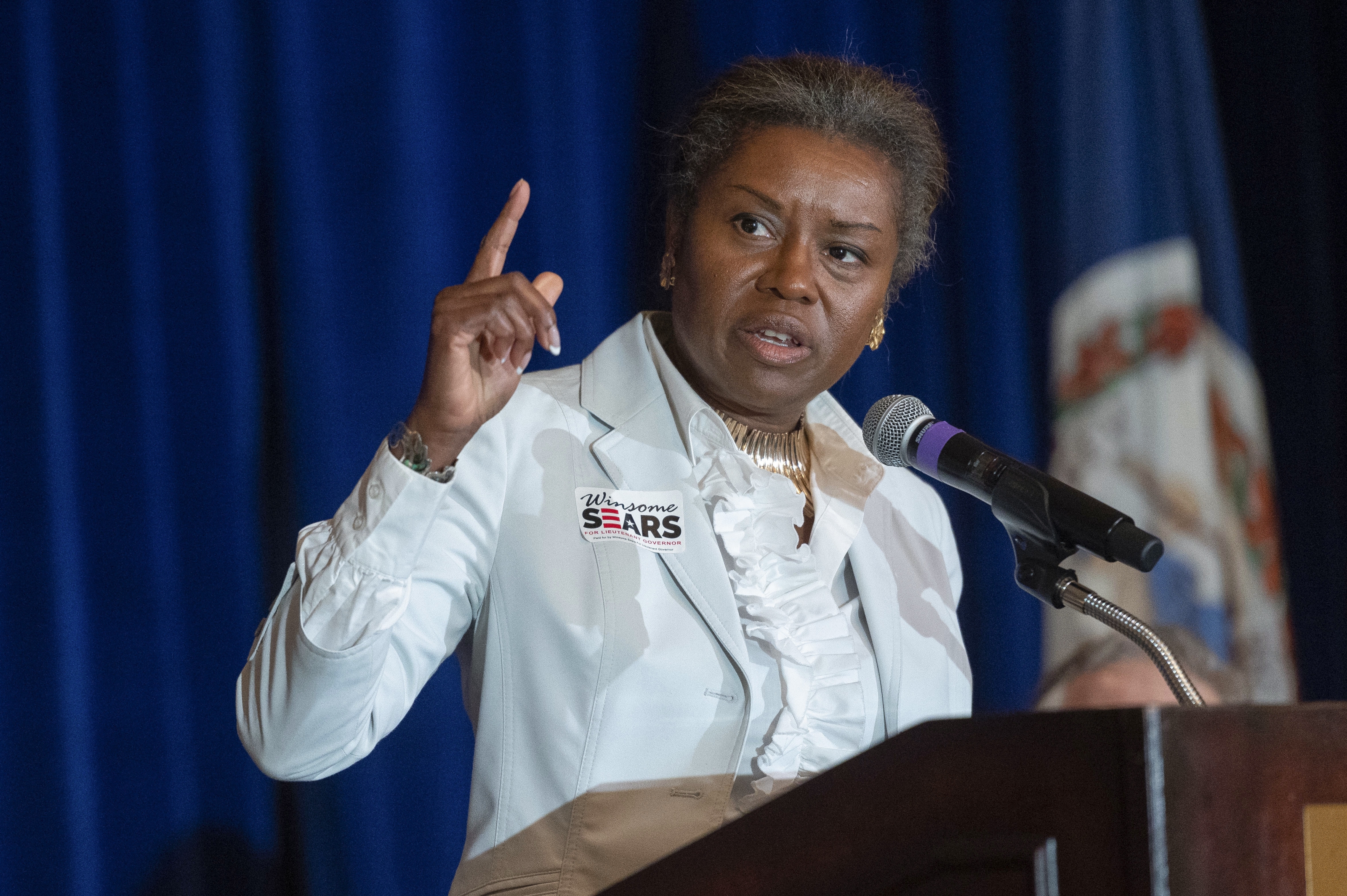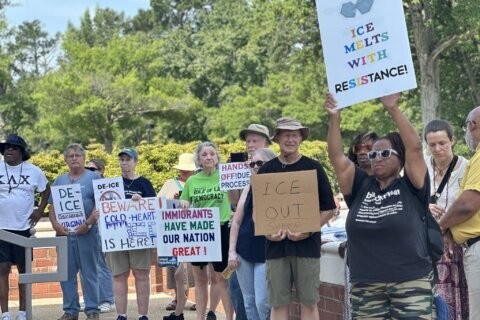
EDITOR’S NOTE: Virginians have a few days left to vote for the commonwealth’s statewide offices — governor, lieutenant governor and attorney general. Seven candidates for those seats — gubernatorial candidates Terry McAuliffe, Glenn Youngkin and Princess Blanding; lieutenant governor candidates Haya Ayala and Winsome Sears, and attorney general candidates Mark Herring and Jason Miyares — sat for conversations with WTOP’s Nick Iannelli.
As is generally the case, there’s been no shortage of attacks in the Virginia campaign, and no shortage of places to find out about them. Some of that is fair game, and important to know; some of it, not so much. Some of it isn’t even true. What we’ve done here is keep phrases such as “my opponent wants …” and “my opponent says …” to an absolute minimum. You’re getting the candidates’ views on themselves, what they would do in office and why they want to do it.
Read Nick Iannelli’s interview with Democratic candidate Hala Ayala.
Winsome Sears, the Republican candidate for lieutenant governor in Virginia, points to her experience on the commonwealth’s board of education and her time in the House of Delegates, where she was the first — and so far still the only — Black Republican woman member. But she told WTOP’s Nick Iannelli that “my story begins with my father.”
Sears’ father arrived in the U.S. Aug. 11, 1963 — 17 days before Dr. Martin Luther King’s “I Have a Dream” speech, she’s quick to point out — with $1.75 in his pocket.
“He took any job he could find and used that money to put himself through school,” Sears said. “He started his career, and now he’s comfortably retired.”
She recalled asking her father, “Why would you come, then? It was a bad time for us.”
“And he said, ‘Because this is where the jobs were.’ I said, ‘Yeah, but you know, you came at the height of the Civil Rights Movement.’ And he said, ‘Well, this is still where the opportunities were.’”
Sears said she was 6 years old when her father came back to Jamaica to bring her to the States: “You have to remember, I am still the immigrant. I am not first-generation American; I am still the immigrant. In fact, when I joined the Marine Corps, I was still a Jamaican — I just was willing to fight for America. Because America has given my father and me and the rest of my family an opportunity to change our lives.”
Sears said she learned about leadership in the Marines, recalling a time when she and the rest of her unit were working 20-hour days getting ready for an inspection. The warrant officer “encouraged us,” she said, but then he changed into his work utility outfit “and he was pushing equipment back and forth with all of us. And he got more out of us that day than all of the other times.”
“So I knew what leadership looks like,” Sears said. “I’m a small woman, and I’m having to tell these great big hulking guys what to do. I have the rank; rank carries authority. But at the same time, with authority comes accountability. And you have to take care of your people.”
Sears pointed to her experience as vice president of the Virginia Board of Education, as well as her work leading education programs with the Hampton Roads Chamber of Commerce, “trying to bridge the gap between business and the schools … so that they could have discussions and network and understand what businesses are looking for. Because we want to attract businesses to Virginia.”
She said the quality of jobs, as well as the number, were key. “We were constantly getting the backroom operations. You know, all work is wonderful; it’s dignified. But we need the front office too.”
She added, “Education lifted my father out of poverty; education lifted me out of poverty, because I have to find my own way in the world, and education will lift all of us out of poverty.”
Vaccines
Sears claimed that COVID-19 vaccine mandates and passports would put the commonwealth on a “slippery slope” regarding medical privacy. She cited the Health Insurance Portability and Accountability Act of 1996 (which says that patient information can’t be disclosed without the patient’s consent, but says nothing about patients answering questions posed to them) as well as concerns about insurance companies using DNA data to set rates.
“Are we going to ask people about their HIV status now?,” Sears said. “We must be very careful about what we’re doing. We are a free society. We love our liberty … let’s allow people to make that decision [to vaccinate] for themselves.”
She declined to say whether she herself is vaccinated, saying, “My life is so very public that I try to keep some things within.”
She added, “If you want to get vaccinated, you do so — absolutely. Otherwise, you mask up; you keep your distance, you do everything in your power to keep yourself safe.”
Abortion, elections
This video is no longer available.
Asked about her stance on the recently enacted Texas law which essentially bans abortion in defiance of Supreme Court precedent, Sears put distance between her own views and the text of the law: “I support the baby in the womb who wants to live,” Sears said. “But I do say that we have to have exceptions for the life and health of the mother. We have to have those exceptions. But I don’t think it’s ever wrong to stand for the baby in the womb.”
While Sears made election integrity a part of her platform in the primary campaign, she replied to a question as to whether the 2020 presidential election was stolen by simply saying, “I voted. And we have a president. We have a vice president. We don’t have time for nonsense. We are now in October; it is time to move on.”
Sears pointed to her own election to the House, the election and reelection of former president Barack Obama, and the election of Vice President Kamala Harris, as signs of racial progress in Virginia and nationwide.
“We have a saying in church: I may not be what I’m supposed to be, but I ain’t what I used to be,” she said. “And that’s America. America may not be what she’s supposed to be, but she ain’t what she used to be.”









